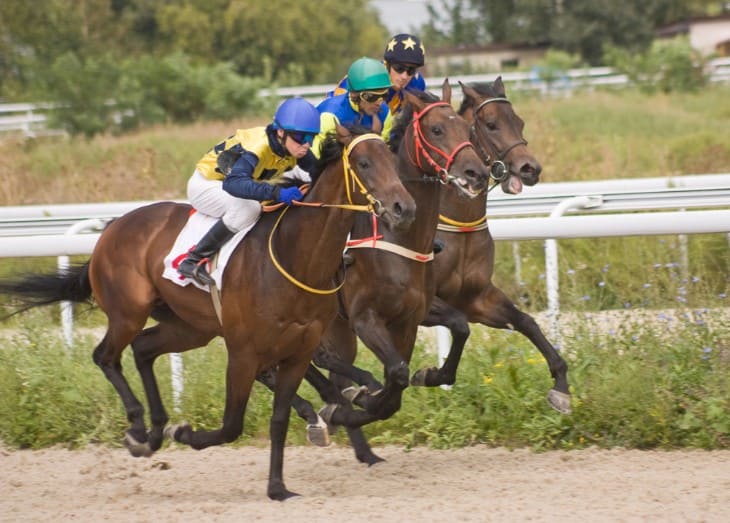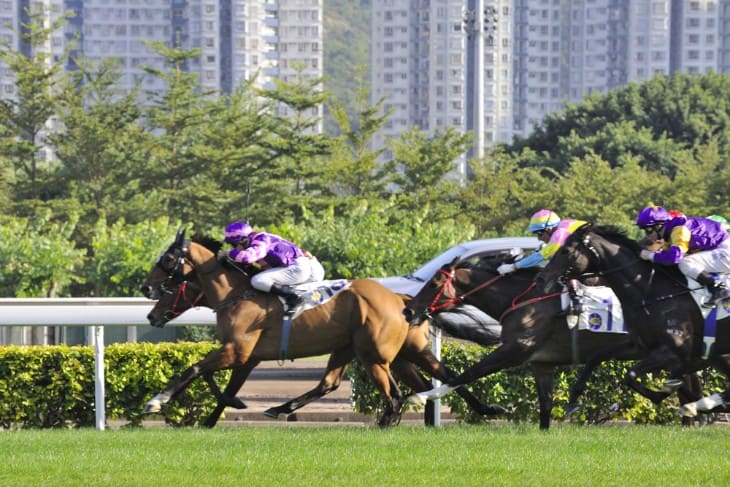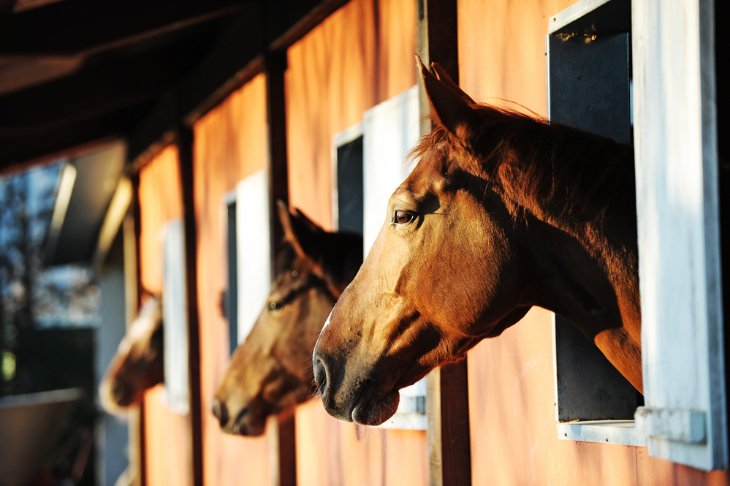In the complex arena of horse racing, where thoroughbreds race and jockeys compete, there is a vital group of individuals pivotal to this sport: the horse grooms. These professionals work behind the scenes, caring for and supporting the horses. Away from the spotlight of race days and amidst the noise of the audience, these grooms ensure the horses are well-prepared, in optimum health, and set to perform at their best.
Horse Grooms in the Racing Industry
The pivotal role played by horse grooms in the racing industry cannot be understated. These individuals are the custodians of equine well-being, responsible for tending to every aspect of a racehorse's life – from its daily care and grooming to its emotional support. Grooms forge deep connections with the horses they care for, understanding their temperaments, quirks, and preferences. This intimate relationship goes beyond mere duty; it's a labour of love that fosters trust and companionship.

A Historical Perspective: Evolution of Horse Grooming Practices
To comprehend the significance of modern-day horse grooms, we must journey back in time to the origins of horse racing. In ancient civilisations, charioteers and riders alike depended on skilled attendants to prepare their horses for battle and competition. Over centuries, grooming practices evolved from basic maintenance to a comprehensive art, encompassing not only cleanliness but also the promotion of optimal health and performance.
Historically, grooms were valued for their ability to detect and treat equine ailments, drawing upon a blend of traditional wisdom and practical experience. As the racing industry progressed, so did the responsibilities of grooms. Their role expanded to encompass the emotional well-being of the horses, recognising the impact of stress and anxiety on performance. Today, horse grooms are multi-faceted professionals who possess a deep understanding of equine psychology, health, and training methods.
The Crucial Link: Understanding the Groom's Relationship with Racehorses
In the heart of every successful racehorse's journey lies a strong and symbiotic bond between the animal and its groom. This connection goes beyond the superficial; it's an intricate dance of trust, empathy, and mutual respect. Grooms spend hours observing their charges, learning their idiosyncrasies, and responding to their needs. They become attuned to subtle changes in behaviour, detecting signs of discomfort or distress that might elude others. This intuitive understanding allows grooms to address issues promptly, ensuring the horses remain in optimal condition.
Racehorses, in turn, develop a familiarity with their grooms, responding to their soothing voices and calming presence. It's not uncommon to see grooms engaging in quiet conversations or gentle pats, forming a language of comfort that transcends words. This emotional connection is a cornerstone of the groom's role, contributing not only to the horse's well-being but also to its performance on the track.
Daily Duties and Responsibilities of Horse Grooms
From the break of dawn to the fading light, horse grooms engage in a meticulous routine that revolves around the care and maintenance of their charges. The day begins with a symphony of feeding, grooming, and mucking out stalls. Grooms meticulously inspect every inch of their horses, checking for injuries, stiffness, or any other signs of unease.
Beyond the physical care, grooms oversee the finer details of a horse's life. They monitor diet, adjusting nutritional plans to meet individual requirements, and ensure that exercise routines are tailored to promote strength and agility. Medication schedules are followed diligently, and grooms collaborate closely with veterinary professionals to manage the health of their equine companions.
In this realm of constant vigilance and hands-on care, grooms cultivate a deep understanding of equine physiology and behaviour. Their expertise is honed through years of experience, transforming them into adept problem-solvers capable of addressing a myriad of challenges that arise in the daily lives of racehorses.
Grooming Techniques: Maintaining the Health and Appearance of Racehorses
Grooming in the racing industry is far more than mere aesthetics; it's a science and an art combined. The sleek, polished exterior of a racehorse reflects the care and attention lavished upon it by its groom. The process involves much more than a routine brush-down; it's a meticulous ritual that involves careful inspection, massage, and even aromatherapy.
Grooms use their skilled hands to assess the condition of the horse's coat, detecting any irregularities, bumps, or hidden discomfort. They apply various techniques, from currying to brushing, to stimulate blood circulation and distribute natural oils, promoting a healthy sheen. The grooming routine isn't just about cleanliness; it's an opportunity for grooms to forge a deeper connection with the horses, calming them and alleviating any tension.
In addition to physical grooming, grooms are adept at recognising the psychological needs of their charges. The grooming process serves as a bonding experience, where the horse learns to trust and relax in the presence of the groom. This emotional connection is crucial, particularly for high-strung racehorses who often encounter stressful situations.
Beyond Grooming: Grooms as Key Support Personnel for Trainers
While the spotlight on the racetrack is rightfully reserved for jockeys and trainers, it's important not to underestimate the integral role played by horse grooms. These individuals act as a bridge between the trainers and the horses, providing valuable insights into the animals' well-being and temperament.
Grooms possess an acute awareness of their charges' behaviour, enabling them to identify signs of stress, discomfort, or illness. This information is relayed to the trainers, allowing adjustments to training routines, dietary plans, and even medical treatments. Grooms often collaborate closely with veterinary professionals, serving as advocates for the horses' needs and ensuring that their health remains paramount.
The Groom's Role on Race Days: Preparation, Calming, and Assistance
Race days are the crescendo of the racing season, where months of training and preparation culminate in high-stakes competition. Amidst the adrenaline-pumping atmosphere, the role of the horse groom takes on added significance. On these crucial days, grooms are a calming presence, a familiar face amidst the chaos.
In the pre-dawn hours, grooms are already hard at work, attending to the horses' needs. They meticulously prepare the racehorses, ensuring their coats gleam and their tack fits perfectly. But their duties go beyond the physical; grooms understand the emotional stress racehorses may experience. Through gentle pats and soothing words, they ease nervous tension and instil a sense of confidence.
As the race approaches, grooms walk the horses, allowing them to familiarise themselves with the track and its surroundings. This routine serves as a calming ritual, helping to soothe nerves and establish a sense of routine amidst the extraordinary. The horses' well-being remains paramount, and grooms are on hand to provide water, sustenance, and last-minute adjustments.
When the moment arrives, and the racehorse and jockey step onto the track, the groom's support doesn't waver. From the sidelines, they watch with bated breath, offering silent encouragement and a knowing smile. Their presence is a testament to the deep bond they share with the horse, a connection that extends beyond the boundaries of the racetrack.
Safety and Welfare: Grooms' Contribution to Equine Well-being
Beneath the glamour and excitement of the racing world lies a steadfast commitment to equine welfare, and at the heart of this dedication are the horse grooms. These individuals are the vigilant guardians of the horses' health and safety, ensuring that every aspect of their care is meticulously attended to.
Grooms play a pivotal role in maintaining a safe and clean environment for the horses. They meticulously inspect stables, paddocks, and equipment, identifying and rectifying potential hazards. Their watchful eyes catch even the slightest signs of distress, from a subtle change in posture to an irregular feed intake, enabling swift intervention and preventative measures.
Additionally, grooms are well-versed in equine first aid, able to administer basic treatments and provide comfort in times of injury or illness. Their knowledge extends beyond routine care; they are attuned to the individual needs of each horse, recognising allergies, sensitivities, and specific dietary requirements.

Skills and Training: Qualities of a Successful Horse Groom
Behind every well-groomed racehorse is a skilled and dedicated groom, whose expertise is honed through years of training and hands-on experience. The role of a horse groom is far more intricate than meets the eye, requiring a unique blend of technical knowledge, intuition, and an unwavering commitment to equine welfare.
A successful horse groom possesses a deep understanding of equine anatomy and physiology. They are adept at detecting even the slightest signs of discomfort, whether it's a slight change in gait or a telltale flinch. This keen observation allows them to address issues promptly, preventing minor concerns from escalating into major problems.
In addition to their medical acumen, grooms must be skilled in various grooming techniques that go beyond mere aesthetics. They must be proficient in handling horses of all temperaments, using a mix of patience, gentleness, and assertiveness. This delicate balance of traits enables grooms to forge strong bonds with the horses they care for, cultivating an atmosphere of trust and respect.
Communication is another key skill in a groom's repertoire. They collaborate closely with trainers, veterinarians, and other stable personnel to ensure that the horse's needs are met. Effective communication ensures that everyone is on the same page, working towards the common goal of the horse's well-being and success on the racetrack.
Conclusion
In the racing industry, success is a team effort, and horse grooms are an indispensable part of that team. Their tireless dedication and expertise contribute immeasurably to the achievements of trainers, jockeys, and owners. As we conclude our journey through the world of horse grooms, let us remember and celebrate these remarkable individuals who embody the true spirit of horsemanship and ensure that the legacy of this timeless sport continues to thrive.








